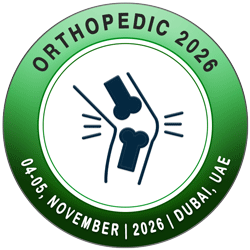Track: Orthopedic Surgery

Orthopedic surgery is a medical specialty focused on diagnosing, treating, and preventing conditions and diseases that affect the musculoskeletal system, which includes bones, joints, ligaments, tendons, muscles, and nerves. The field encompasses a wide range of treatments, from conservative management such as physical therapy and medications to surgical interventions like joint replacement, arthroscopy, and fracture repair. Orthopedic surgeons use a variety of techniques to restore function and relieve pain for patients experiencing musculoskeletal issues, ensuring mobility and improving quality of life.
Key Topics and Highlights:
Minimally Invasive Surgery: Focus on the benefits and challenges of minimally invasive techniques like arthroscopy and robotic-assisted surgeries for joint injuries and diseases.
Joint Replacement Techniques: Modern approaches in total joint arthroplasty (hip, knee, shoulder), with an emphasis on the integration of advanced prosthetic technologies to improve patient outcomes.
Fracture Management: Surgical methods for treating complex fractures, including the use of internal fixation and bone grafts for optimal healing.
Orthopedic Innovations: Advancements in surgical materials and instruments, such as 3D-printed implants and bioengineered tissues, designed to improve recovery and reduce complication rates.
Rehabilitation and Recovery: Best practices for postoperative care, focusing on rehabilitation strategies to enhance mobility and long-term function.
Summary:
The Orthopedic Surgery session at Orthopedic 2025 will focus on advancements in joint replacements, fracture management, and minimally invasive surgical techniques. Key topics include the use of robotic-assisted surgery, 3D-printed implants, and effective post-surgical rehabilitation strategies for optimal recovery and functionality.
Scientific Highlights
- Orthopedic Surgery
- Orthopedics and Sports medicine
- Orthopedics and Arthroscopy
- Orthopedic Physiotherapy
- AI and Robotics in Orthopedics
- Arthritis: Types, Diagnosis and Treatment
- Arthoplasty and Oncology
- Musculoskeletal Disorders, Medical and Clinical Trials
- Rheumatology and Arthritis
- Foot & Ankle Surgery
- Spine Disorders and Surgery
- Physical Medicine and Rehabilitation
- Neurology and Orthopedic surgery
- Orthopedic Radiology
- Orthopedics and Osteoporosis
- Other Orthopedic Trauma: Surgery and Conditions


